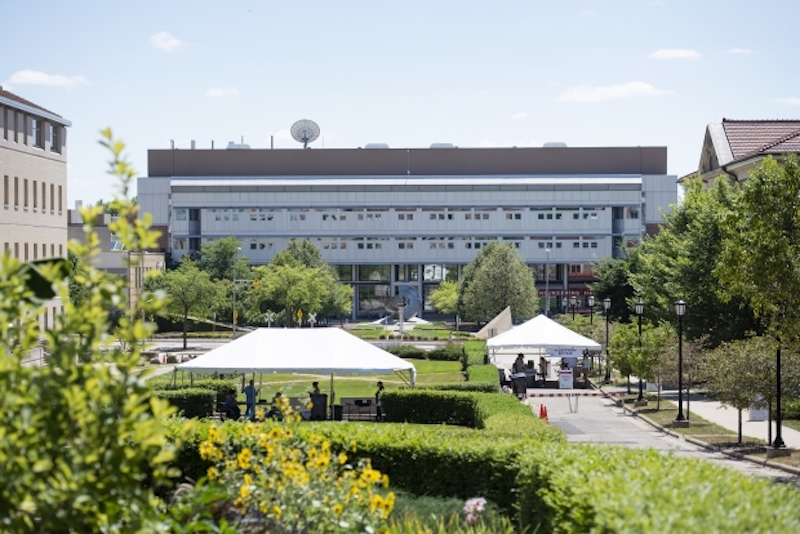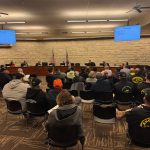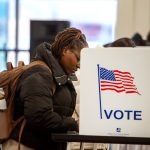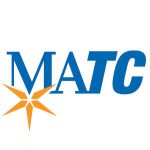UW System Begins In-Person Classes
As outbreaks drive other universities online, Thompson says UW has 'got to try’.

UW-Madison COVID-19 testing tents. Photo by Angela Major/WPR.
On Saturday, Aug. 22 it was a sunny day, as dozens of cars, trucks and trailers peppered parking lots surrounding residence halls at the University of Wisconsin-Eau Claire. It was the first time since March that the upper campus had this much life. For more than five months, UW-Eau Claire and all other UW System campuses had been mostly empty after administrators moved classes online and told students to go home if at all possible after the first positive cases of COVID-19 were reported in Wisconsin in March.
As families moved couches, lamps, clothes and an expected 3,941 eager students into UW-Eau Claire dorms, the Wisconsin Department of Health Services reported a total of just over 70,000 people in the state had contracted the virus.
Alix’s parents, Jody and Tony, agree with the plan, and the hope is for their daughter to get as much of the college experience as possible this semester. If things change, they’ll make the two and a half-hour drive from Fremont, Wisconsin and bring her back home to finish her classes online.
Tens of thousands of students started classes Wednesday at most University of Wisconsin System campuses, just months after concerns about COVID-19 led administrators to send them home to take courses online.
While outbreaks have already shut major universities down across the U.S., UW System Interim President Tommy Thompson has said that “I’ve got to try” to keep students on campus during the pandemic. Yet many students expect the virus will upend their semesters once again.
Testing Its Way Through Fall Semester
COVID-19 testing lies at the heart of the UW System’s plan to keep campuses and residence halls open this fall. During an Aug. 20 UW Board of Regents meeting, Thompson told members he thinks the UW System’s testing plan is the best in the nation. An earlier press release from Thompson’s office promised 34,000 RT-PCR tests, which are highly accurate in diagnosing cases but can take more than 24 hours to process. It also promised 317,000 antigen tests, which are cheaper and less accurate but can produce results in 15 minutes. The tests are being purchased with $32 million in federal CARES Act relief bill. Thompson originally asked Gov. Tony Evers for $110 million to buy tests and protective equipment in July.
The goal is to screen every student living in residence halls on campuses other than UW-Madison twice a month with antigen tests to detect and stem outbreaks by quarantining students who test positive. All other students will be tested if they develop symptoms.
UW-Madison has its own COVID-19 testing strategy, which is the most comprehensive of all UW System schools. The campus is offering PCR tests for all students and employees that want one. In addition, all students in residence halls will be tested twice a month, and cohorts of off-campus students can also volunteer for surveillance testing.
No UW System campuses tested students before they returned to campus. The Centers for Disease Control and Prevention hasn’t recommended testing students before entry. CDC guidelines also note the effectiveness of surveillance testing has not been studied.

Student moves in UW-Eau Claire dormitory. Photo by Rich Kremer/WPR.
Even before classes began, the UW System’s testing plan has run into problems. Thompson told Regents the federal government tried to redirect its antigen tests and the machines used to process them to the nation’s nursing homes.
“So now the president of the United States gets the ball with the federal government, and they want to buy 10 million of these machines,” he told the UW Board of Regents August 20. “And little Wisconsin got into a fight with the federal government over our 36 machines.”
Thompson said he prevailed by convincing test maker Quidel that “we deserve better than the nursing homes.” The deal, Thompson said, included a vow from Quidel to do everything it can to ship 20,000 tests per week to the UW System. Tuesday, a UW System spokesman told WPR in an email they had received a total of 44,000 antigen tests that were being distributed to campuses based on student housing populations.
Communications staff at UW-Eau Claire told WPR the campus had just received 3,600 antigen tests on Tuesday that will be used to begin screening the nearly 4,000 dorm residents twice a month.
Testing strategies vary significantly across the nation’s universities. The University of Michigan has required all students to test negative for COVID-19 before coming to campus. It is also providing diagnostic testing and voluntary surveillance testing of groups of students and faculty. The University of Alabama System of universities also required all students to test negative before returning to campus. Despite the requirement, the state’s flagship University of Alabama has reported more than 1,000 positive cases of COVID-19 since Aug. 19.
The University of North Carolina at Chapel Hill, Northwestern University in Chicago and Michigan State have moved classes online within weeks of the start of classes due to COVID-19 outbreaks. The University of Minnesota Board of Regents has moved classes online at three campuses for two weeks.
According to a running tally by Davidson College in North Carolina, 177 U.S. colleges and universities have moved classes fully online due to COVID-19.
Schools Urge Students To Do Their Part Off Campus
Over the summer, UW System administrators spent months on plans to prevent students and employees from infecting one another. Face masks are required, lecture halls that can hold hundreds of students will now seat just dozens, hand sanitizing stations will dot hallways and some campuses will require students to record their temperatures daily.
Many UW System campuses have required students to sign pledges promising they will commit to campus rules or face disciplinary actions including suspension.
But ultimately, campuses have little control over what students do when they leave campus.
UW-Madison is attempting to manage off-campus behavior by warning students they could be suspended for attending parties or large gatherings. A follow-up email to students said Dean of Students Christina Olstad visited off-campus apartments accompanied by the UW-Madison Police Department to remind them.
The email drew outrage from the campus TAA graduate student employees union, which tweeted the visits were meant to “terrorize” students.
One common theme among campuses that have shifted to online instruction due to COVID-19 outbreaks is reports of large numbers of students attending house parties or going to popular college bars.
UW System President Thompson, in addition to reminding students that their off-campus behavior could make the difference between a full semester or a shift to online classes, teamed up with the Tavern League of Wisconsin to send a letter to bar and restaurant owners asking them to enforce mask mandates and encourage social distancing to keep students on campus.
In Eau Claire, bars along the city’s Water Street apparently didn’t get the message the weekend before classes started. Early Sunday morning, a line of students stretched along the front of The Pickle, a bar and dance club. Some patrons waiting to get in wore masks, but most did not

Students pack into Eau-Claire bar. Photo by Rich Kremer/WPR.
The Eau Claire City-County Health Department has issued three notices about potential COVID-19 exposure at The Pickle this summer.
Anna Song is an associate professor of health psychology at the University of California Merced who specializes in the relationship between perception, attitude and risk behaviors. She said college-age adults are generally more motivated by emotions and social connections than by “complex cost-benefit analysis,” and that blaming them for engaging in normal behaviors isn’t fair.
“I think the most important thing that we can do, and this is sometimes the hardest thing that we can do, is that we just have to be realistic with what we’re dealing with here,” said Song. “And if we’re not realistic, you know, the consequences can be severe.”
On Tuesday, the New York Times reported more than 26,000 cases of COVID-19 at more than 750 colleges nationwide.
Campuses Doing ‘The Best They Can’
UW-River Falls professor of human anatomy and physiology Tim Lyden sits on a faculty advisory committee planning the fall response to COVID-19. He said he is comfortable the campus and system leaders are “doing the best possible job” they can under current circumstances.
Lyden criticized the federal response to the COVID-19 pandemic and said it was “just ridiculous” that the UW System had to fight to keep its test order intact. “I mean, access to the kits should not be something that’s contested and that the state has to fight for to get access,” Lyden said.
Lyden noted that computer modeling has shown antigen testing works best at detecting outbreaks when administered at least twice a week. He said the UW System’s plan to test dorm residents twice a month is not ideal, but that it’s better than nothing.
Lyden said that as of last week, the campus had received two machines from the UW System to process antigen tests, but recently found out the supply of tests “wasn’t so firm.”
A follow up email to campus communications staff, Tuesday, asking how many tests the campus has received from the central office was not returned.
UW-Whitewater philosophy professor and faculty senate Chair Tracy Hawkins is eager to start teaching during what she calls a “normal-adjacent” semester. She said around 60 percent of the university’s core classes have some element of face-to-face instruction, but faculty members are trying to prepare for all possibilities. Hawkins said a colleague’s fall syllabus is 26 pages long to account for contingencies.
“So, I think people are still feeling a little, you know, like they don’t have a clear picture of what’s about to happen and how things are going to go,” Hawkins said.
One common question, she said, is, who covers classes if a faculty member tests positive for COVID-19 and has to miss three weeks of classes?
On top of all other concerns, Hawkins worries about how faculty and staff with young children will be affected if local schools keep classes online. This spring, when schools and daycare centers closed, she and her spouse took turns juggling work and caring for their two children, an experience she said was “hard and exhausting.”
Hawkins has relied on the campus child care center this summer, but on Aug. 16 Chancellor Dwight Watson announced that a center employee tested positive for COVID-19, resulting in one of the classrooms being closed through the month.
Some Push Back Against Repoening
Over the past month, unions and associations representing UW System university faculty and staff have urged the UW System not to require in-person classes this fall amid the COVID-19 pandemic. The Wisconsin chapter of the American Association of University Professors urged the UW System and private universities to rescind policies requiring in-person classes “that may endanger the health of other campus employees.”
On Aug. 24, a letter was sent to UW-Madison Chancellor Becky Blank and the director of Public Health Madison and Dane County by 28 members of the Dane County Board of Supervisors, Madison Common Council and Madison Metropolitan School District. The letter called it shocking that the university planned to hold 45 percent of classes with some form of in-person learning, and called for nearly all classes to be moved online and for limits to be imposed on the number of students living in campus student housing.
Thompson responded with his own letter to the local health department, city council and county board, calling the threshold used in the health order “unrealistic” and urging the department to “take a more holistic view” to decide how, or if, K-12 schools can open.
Don Moynihan, the chair of the McCourt School of Public Policy at Georgetown University, said while he doesn’t think it’s feasible to have large numbers of students in close proximity on college campuses, he also said public universities are in a no-win situation.
“You have parents and students and many politicians who want students to be on campus at the same time,” Moynihan said. “Once those students come on campus and if they start getting sick, then universities are going to be held accountable for that. So, it’s a lot of risk, regardless of what choice they make.”
Expecting Campus Closures
UW-Eau Claire sophomore Wyatt Cameron doesn’t hold out much hope for the campus finishing the fall semester without moving classes online. On Aug. 25, he got a sore throat and got tested for COVID-19. While it was being processed, he was told to move from his apartment-style dorm room into the campus’s aging Putnam Hall, which was slated for demolition but is now being used for isolation and quarantine. Cameron spent three nights in isolation before being told he’d tested negative for COVID-19.
He said as soon as students started moving into UW-Eau Claire’s residence halls, he saw multiple examples of people ignoring campus rules meant to stem outbreaks.
“There’s probably over 50 people playing basketball right next to each other. No facemask, nothing,” said Cameron. So, if that’s part of the attitude about it, you know that it’s just not going to be possible. And, you know, I’d love to be wrong.”
Collin Petry, a junior at UW-Eau Claire, said he feels comfortable that the campus can make it through the full semester with no major changes. But just to make things interesting, he posted a “Quarantine Pool” on a popular student Facebook page wherein students can guess which day they think UW-Eau Claire will move classes online and send students home.
Petry says with 189 responses, most have indicated they think campus will close on a Friday, within the first month of classes.
UW System Begins In-Person Classes As Outbreaks Drive Other Major Universities Online was originally published by Wisconsin Public Radio.
More about the Coronavirus Pandemic
- Governors Tony Evers, JB Pritzker, Tim Walz, and Gretchen Whitmer Issue a Joint Statement Concerning Reports that Donald Trump Gave Russian Dictator Putin American COVID-19 Supplies - Gov. Tony Evers - Oct 11th, 2024
- MHD Release: Milwaukee Health Department Launches COVID-19 Wastewater Testing Dashboard - City of Milwaukee Health Department - Jan 23rd, 2024
- Milwaukee County Announces New Policies Related to COVID-19 Pandemic - David Crowley - May 9th, 2023
- DHS Details End of Emergency COVID-19 Response - Wisconsin Department of Health Services - Apr 26th, 2023
- Milwaukee Health Department Announces Upcoming Changes to COVID-19 Services - City of Milwaukee Health Department - Mar 17th, 2023
- Fitzgerald Applauds Passage of COVID-19 Origin Act - U.S. Rep. Scott Fitzgerald - Mar 10th, 2023
- DHS Expands Free COVID-19 Testing Program - Wisconsin Department of Health Services - Feb 10th, 2023
- MKE County: COVID-19 Hospitalizations Rising - Graham Kilmer - Jan 16th, 2023
- Not Enough Getting Bivalent Booster Shots, State Health Officials Warn - Gaby Vinick - Dec 26th, 2022
- Nearly All Wisconsinites Age 6 Months and Older Now Eligible for Updated COVID-19 Vaccine - Wisconsin Department of Health Services - Dec 15th, 2022
Read more about Coronavirus Pandemic here




















